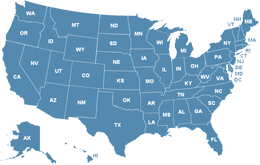State Councils on Developmental Disabilities
State Councils on Developmental Disabilities (Councils) are federally funded, self-governing organizations charged with identifying the most pressing needs of people with developmental disabilities in their state or territory. Councils are committed to advancing public policy and systems change that help these individuals gain more control over their lives.
The 56 Councils across the United States and its territories work to address identified needs by conducting advocacy, systems change, and capacity building efforts that promote self-determination, integration, and inclusion. Key activities include conducting outreach, providing training and technical assistance, removing barriers, developing coalitions, encouraging citizen participation, and keeping policymakers informed about disability issues.
Diverse Council Membership
Council members are appointed by a state’s governor; by law, more than 60 percent of a Council’s membership must consist of individuals with developmental disabilities or their family members. Advocates and state agency representatives also serve as members. This diversity enables Councils to better analyze and improve systems and services within a state and ensure that the voices of people with developmental disabilities and their families are heard.
Empowerment through Self-Advocacy
Councils focus on empowering individuals through activities that teach self-advocacy skills and support self-determination. By empowering individuals and their families to both advocate for themselves and seek long-term solutions through systems change, Councils are creating an environment of self-sufficiency, self-determination, inclusion, and acceptance. Councils also play a critical role in quality assurance and as innovators in the development of person-centered systems.
State-Level Planning and Goal Implementation
To serve their communities, Councils design 5-year state plans that address new ways of improving service delivery. To implement the state plans, Councils work with different groups in many ways, including educating communities to welcome people with developmental disabilities, funding projects to show new ways that people with disabilities can work, play, and learn, and seeking information from the public and from state and national sources.


